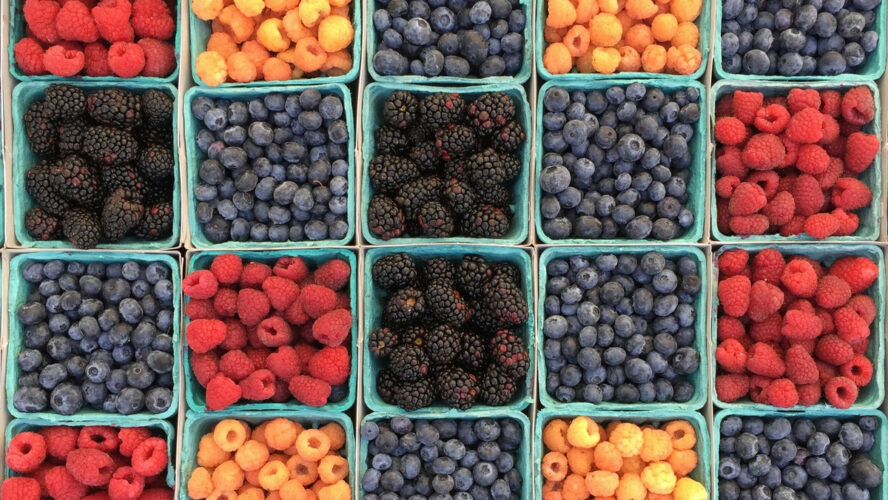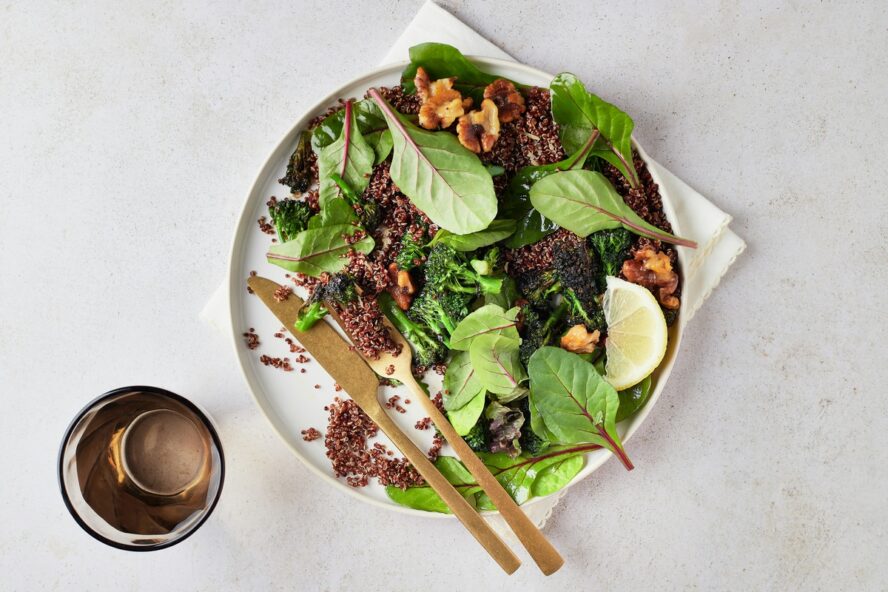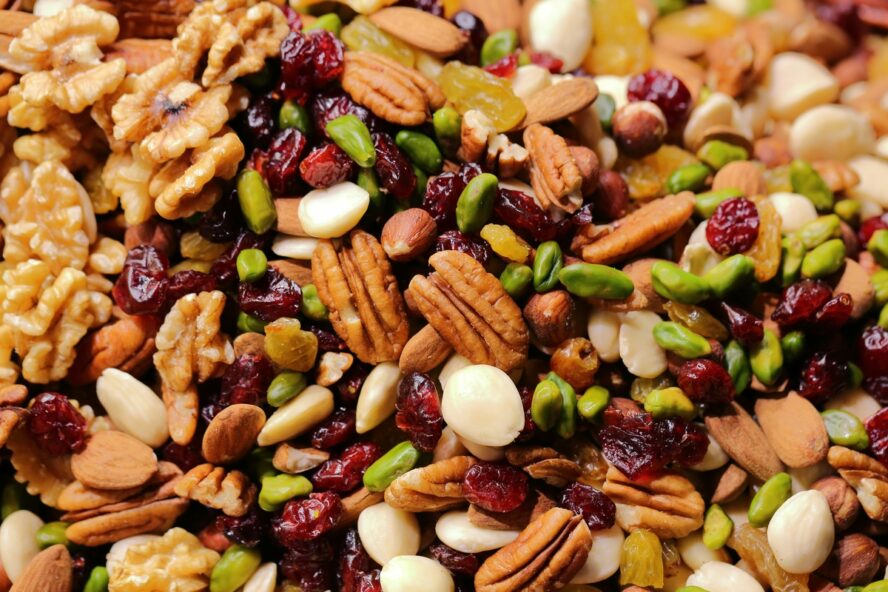
New research presented at the annual meeting of the American Society for Nutrition shows that a diet rich in leafy greens, berries, nuts, and olive oil could significantly reduce the risk of Alzheimer’s and dementia. The study, which drew on data from nearly 93,000 American adults, found that adhering to the aptly-named MIND diet could reduce dementia risk by a life-changing 9%.
A 2025 study in Nature Medicine showed that by 2060, the number of adults in the U.S. with dementia will likely double to a million1 — which means taking care of our brains is essential. And thankfully, the study showed that it’s never too late to start: Those who improved their diet over time saw a 25% lower risk of developing dementia later in life. All the more reason to lean into the MIND diet starting with your very next meal (here’s why we’d go as far as to say the MIND diet is the best possible diet for your brain).
What Is the MIND Diet?
The MIND diet — short for Mediterranean-DASH Intervention for Neurodegenerative Delay — is a blend of two diets: the Mediterranean diet and the DASH (Dietary Approaches to Stop Hypertension) diet. Developed in 2015, the MIND diet has proven time and again to improve cognitive health, as shown in a 2016 study in Alzheimer’s and Dementia2, a 2021 study in the Journals of Gerontology Series A: Biological Sciences and Medical Sciences3, and a 2023 and 2024 study in the New England Journal of Medicine4.
Most of the major differences between the MIND diet, DASH, and the Mediterranean diet come down not to what they permit, but “the emphasis of concerns they help with,” according to Naturopathic Doctor Serena Goldstein.
“The MIND diet is more for cognitive/brain health, the DASH diet is to help lower blood pressure, and the Mediterranean diet is more for heart health, prevention, and overall wellness,” she says. “They all offer suggestions around whole foods (i.e. fruits, vegetables, healthy fats) while limiting processed foods and sugar, though some of their differences include the amount of servings and emphasis they have on different food groups.”
Want more insight into what foods to incorporate or avoid in your diet? Sign up for the newsletter for more well-researched, non-toxic living guidance and smart wellness advice.
5 MIND Diet Foods to Boost Brain Health
The MIND diet marries the Mediterranean diet’s whole grains, fruits, vegetables, legumes, and olive oil with DASH’s emphasis on consuming nutrient-dense fruits and vegetables like leafy greens and berries. Here are the five foods you’ll definitely want to include to prioritize brain health.
1. Berries

Berries are some of the healthiest foods on the planet, rich in fiber, vitamins, and antioxidants. Blueberries, blackberries, and raspberries have the highest antioxidant activity of any commonly consumed fruit aside from pomegranates, according to 2008 research in the Journal of Agricultural and Food Chemistry5.
The anti-inflammatory benefits of these tiny superfoods have also been found to enhance neuroplasticity and protect against neurodegenerative disease, according to a 2014 paper in Neural Regeneration Research6.
The MIND diet recommends consuming at least two servings a week of these fruits. When they’re no longer at their summer peak, reach for frozen berries: 2015 research found that frozen blueberries and strawberries retained all of their nutritional content — and sometimes even boasted higher vitamin contents than their fresh counterparts7.
Recipes to Try
2. Leafy Greens
The MIND diet also prioritizes leafy greens like kale, spinach, and broccoli (learn more about how you can keep your mind sharp with spinach, lettuce, and other leafy greens here). The health benefits of these greens don’t exactly come as a shock. Kale and broccoli are notably rich not just in antioxidants and fiber, but also in anti-cancer compound sulforaphane8, and spinach’s high potassium content has been linked to lowered blood pressure9.

Plus, when it comes to memory specifically, these veggies are loaded with benefits. One 2017 study in Neurology found that after five years of consuming leafy greens at least once a day, older people had a slower rate of mental decline — more specifically, the equivalent of turning their brain-aging clock back 11 years10.
Similarly, a 2016 study in Pharmacognosy Review found that spinach boasted such positive effects on cognition and memory that the study authors dubbed it “the anti-Alzheimer’s plant11.” And in 2025, a study in Heliyon showed that the sulforaphane present in both kale and spinach could have “anti-Alzheimer’s activities.”
To achieve these benefits, the MIND diet recommends six or more servings of leafy greens per week. The good news is, they’re super versatile — enjoy them raw, steamed, baked, fried, and more (or check out our articles on 7 unique ways to cook kale or 5 ways to cook spinach perfectly every time)!
Recipes to Try
3. Nuts
Nuts like almonds, walnuts, and pistachios are also encouraged in the MIND diet, and for good reason. There are numerous things to love about nuts, from heart health to potential weight loss, but their benefits for the brain might be most impressive of all. A 2023 study in Clinical Nutrition found that daily consumption of nuts benefitted blood flow to the brain and improved verbal memory in adults12.

Another 2023 study in Nutrients noted that evidence suggests nuts play a role in the prevention of cognitive decline13. And while all nuts are good for your brain, it called out the aptly brain-shaped walnut as “the nut type most promising for cognitive health,” as they feature more omega-3 fatty acids than any other nut. Indeed, a 2025 study in Food & Function found that young adults who ate 50 grams of walnuts each morning had better reaction times and memory performance later in the day14.
Walnuts aren’t the only nut that could improve your brain health. A 2022 study in Nutritional Neuroscience found that daily consumption of three ounces of almonds could contribute to “significant improvement,” specifically in visual and spatial memory15. A 2020 study in Antioxidants also found that pistachio consumption could prevent neurodegeneration linked to obesity16.
In short, eat a variety of nuts! The MIND diet recommends five or more servings per week, so get creative — try including them in salads, granola, atop your breakfast oatmeal, or on their own as an easy snack.
Recipes to Try
4. Fatty Fish

Fish has long enjoyed a good reputation as a brain food, and one look at its nutrient content will tell you why. Fish is a powerhouse of omega-3 fatty acids, which a 2022 research review in Cureus associated with increased learning, memory, cognitive well-being, and blood flow in the brain17. We’ve even covered how omega-3 fatty acids could slow biological aging and reduce breast cancer risk.
And while the research had already shown the importance of omega-3s for the aging population, a 2022 study in Neurology found that even younger people could benefit from consuming more omega-3s, essentially protecting their brain from aging before it begins18.
The MIND diet recommends one or more servings of baked, steamed, or grilled fish per week. And unlike with many other food groups, the more fat the better when it comes to fish and brain health. Fish like herring, mackerel, salmon, and sardines are particularly rich in omega-3 fatty acids and thus have even more powerful brain-boosting benefits.
Recipes to Try
5. Whole Grains
Whole grain consumption can lead to a reduced risk of cardiovascular disease and diabetes — both of which are linked to mood issues and memory problems. A 2023 study in Neurology found that specifically for Black individuals, eating more than three servings of whole grains daily could contribute to a slower rate of cognitive decline.
A 2023 research review in Advances in Nutrition noted that while the effects of whole grains on cognition remain inconclusive, whole grain consumption has indeed been associated with improved mood and lessened anxiety19.
The MIND diet recommends three or more servings of whole grains daily. Enjoy them unrefined in grain bowls and salads, or choose whole grain pastas and breads to tick this delicious box.
Recipes to Try
Foods to Avoid for Brain Health

Just as important as adding certain foods? Avoiding others. Followers of the MIND diet are counselled to steer clear of a few common foods. It limits consumption of red meat, which a 2025 study in Neurology linked to a higher risk of developing dementia and worse cognition20 (not to mention several other serious diseases, including colon cancer for women). It recommends relying on chicken, beans, and pulses instead.
The MIND diet also warns against sugar and fried foods, and recommends cooking in heart-healthy olive oil.
According to Goldstein, it’s just as important to avoid these inflammatory foods as it is to incorporate brain-healthy foods. “People can get inflammatory reactions to foods (i.e. stomach upset, bloating, breakouts, headaches), yet don’t always necessarily avoid them — or may not realize they are the culprit,” she explains. “Hence, they can eat a lot of healthful, good foods, yet if their diet is still riddled with foods they need to steer clear of, then that can prolong their healing process.”
Alongside what you eat, do your best to also consider when you eat. “Having regular meals (versus constant snacking) at scheduled times can help improve any blood sugar issues and cravings, a common concern around cognition,” she says.
Sources:
- https://pubmed.ncbi.nlm.nih.gov/39806070/
- https://pmc.ncbi.nlm.nih.gov/articles/PMC4581900/
- https://pmc.ncbi.nlm.nih.gov/articles/PMC8893189/
- https://www.nejm.org/doi/full/10.1056/NEJMoa2302368
- https://pubs.acs.org/doi/abs/10.1021/jf801381y
- https://journals.lww.com/nrronline/fulltext/2014/09160/neuroprotective_effects_of_berry_fruits_on.13.aspx
- https://pubmed.ncbi.nlm.nih.gov/25526594/
- https://pmc.ncbi.nlm.nih.gov/articles/PMC10313060/
- https://www.sciencedirect.com/science/article/pii/S0022316623005990?via%3Dihub
- https://www.neurology.org/doi/10.1212/WNL.0000000000004815
- https://pmc.ncbi.nlm.nih.gov/articles/PMC5214553/
- https://www.clinicalnutritionjournal.com/article/S0261-5614(23)00167-X/fulltext
- https://pmc.ncbi.nlm.nih.gov/articles/PMC9965316/
- https://pubs.rsc.org/en/content/articlelanding/2025/fo/d4fo04832f
- https://pubmed.ncbi.nlm.nih.gov/33448906/
- https://pmc.ncbi.nlm.nih.gov/articles/PMC7222408/
- https://pmc.ncbi.nlm.nih.gov/articles/PMC9641984/
- https://www.neurology.org/doi/10.1212/WNL.0000000000201296
- https://pmc.ncbi.nlm.nih.gov/articles/PMC10334137/
- https://www.neurology.org/doi/10.1212/WNL.0000000000210286

